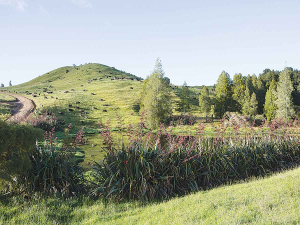DairyNZ Calls for Changes to Government’s Proposed Resource Management Act Reform
DairyNZ says the Government’s proposed Resource Management Act reform needs further work to ensure it delivers on its intent.
 Funding will be available to support actions like installing mini wetlands, removing sediment, riparian planting, helping farmers with stock exclusion and developing farm plans.
Funding will be available to support actions like installing mini wetlands, removing sediment, riparian planting, helping farmers with stock exclusion and developing farm plans.
The Government has taken on board dairy sector feedback in its revised Essential Freshwater package but issues remain, says DairyNZ.
Over the last eight months the dairy lobby has advocated for an evidence-based and pragmatic approach to freshwater regulation.
DairyNZ chief executive Tim Mackle says it is pleased to see the Government has listened and made significant changes to some of the more controversial elements of their original proposal.
However, there’s still a sting in the tail, says Mackle.
“Like all New Zealanders, dairy farmers share ambitions for healthy waterways and have invested a lot of time and money for over a decade in improved management systems, upgrading effluent systems, riparian planting and fencing streams to exclude cattle.
“Looking at where the policy has landed, it appears that the Government have taken a better approach in terms of scientific rigour and practicality for farmers on the ground.”
The Government have parked the dissolved inorganic nitrogen (DIN) measure and removed the impractical and expensive requirement for farmers to move existing fences to meet new stock exclusion guidelines, two policies of great concern for farmers.
But DairyNZ is also concerned that the minister intends to revisit the DIN in 12 months.
Mackle says the proposed 95% protection standard will severely affect farmers in catchments who are already taking significant action towards reducing their footprint in line with new Regional Council policy plans.
For example, in Canterbury’s Selwyn and Hinds zones farmers are already working towards a 30% reduction in nitrogen. Under these new regulations, these reductions may need to increase to 70% to meet the standards being proposed.
“The Government and regional councils need to take a more nuanced approach when it comes to rolling out plans in regions where farmers are already undergoing significant change due to recent nutrient limits.”
Budou are being picked now in Bridge Pā, the most intense and exciting time of the year for the Greencollar team – and the harvest of the finest eating grapes is weeks earlier than expected.
The Real Estate Institute of New Zealand (REINZ) has released its latest rural property report, providing a detailed view of New Zealand’s rural real estate market for the 12 months ending December 2025.
Rural retailer Farmlands has released it's latest round of half-year results, labeling it as evidence that its five-year strategy is delivering on financial performance and better value for members.
OPINION: "We are back to where we were a year ago," according to a leading banking analyst in the UK, referring to US president Donald Trump's latest imposition of a global 10% tariff on all exports into the US.
DairyNZ says the Government’s proposed Resource Management Act reform needs further work to ensure it delivers on its intent.
Overseas Trade Minister Todd McClay says he's working constructively with the Labour Party in the hope they will endorse the free trade agreement (FTA) with India when the agreement comes before Parliament for ratification.

OPINION: A mate of yours truly reckons rural Manawatu families are the latest to suffer under what he calls the…
OPINION: If old Winston Peters thinks building trade relations with new nations, such as India, isn't a necessary investment in…